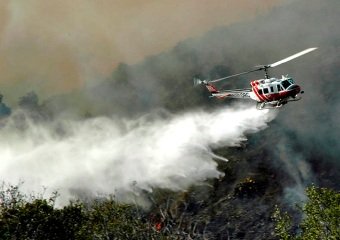 According to the National Interagency Fire Center, an average of over 5.8 million acres of wild land is ravaged by fire each year in the United States. Much of this land is vital habitat for the very animals hunters target, meaning that protecting it from fire is key to sustaining hunting. You saw Bambi. When forests burn, animals are forced to move elsewhere or starve. Exercising a little extra fire safety caution is well worth protecting cherished hunting grounds.
According to the National Interagency Fire Center, an average of over 5.8 million acres of wild land is ravaged by fire each year in the United States. Much of this land is vital habitat for the very animals hunters target, meaning that protecting it from fire is key to sustaining hunting. You saw Bambi. When forests burn, animals are forced to move elsewhere or starve. Exercising a little extra fire safety caution is well worth protecting cherished hunting grounds.
Never leave a campfire unattended. When it’s time to turn in at camp for the night, or take off to scout in the morning, take the time to properly extinguish your campfire. Use plenty of water to extinguish all of the embers and keep a shovel nearby to stir the contents of your fire pit until it is cold to the touch. If camp isn’t near a water source, use dirt to extinguish the embers and mix until cool. Don’t bury your fire, though. Simply covering a fire with dirt may allow embers to continue to smolder, which is the opposite of our goal here.
Smokers, beware. When it’s time to put out that cigarette, be sure to completely extinguish it by crushing the butt in dirt or sand. If you must smoke, preferably carry a coffee can of sand with you to extinguish and store your used butts in. Pay attention to where ashes may drop and only smoke in areas with a minimum 3’ clearance of vegetation. Then go home and consider all of the benefits of quitting. (I’m a mom, you didn’t expect me not to mention it, did you?)
Equip your ATV with a spark arrestor. Using an ATV while hunting can be fun and efficient, however before taking off be sure that your ATV is equipped with a spark arrestor. The devices work by trapping larger hot exhaust particles that have been expelled by internal combustion engines. It’s never a good thing to be setting spot fires behind yourself.
Don’t park the truck in dry grass. Just because we have trucks that can go off road, doesn’t mean that it’s a great idea to park them there. When the time comes to park the rig and head out on foot, be sure that your vehicle isn’t parked in tall dry grass or other vegetation. Catalytic converters and hot exhaust systems can easily spark a fire. In which case, you’ll probably lose some dignity and a truck.
Keep basic fire suppression equipment with you. Pack a shovel, a 5-gallon can of water and a fire extinguisher with the rest of your hunting gear. Being prepared in case of a fire, be it one that you accidentally start or happen to come across, may be the difference between 5 square feet and 500 acres of charred land.
Hunters are often billed as some of the best outdoorsmen (and women!) and stellar stewards of the land. However, novice and experienced hunters alike have also been responsible for some of the most devastating wildfires in recent memory. Be smart, be safe and be prepared to avoid the dangers of wildfire while hunting.








